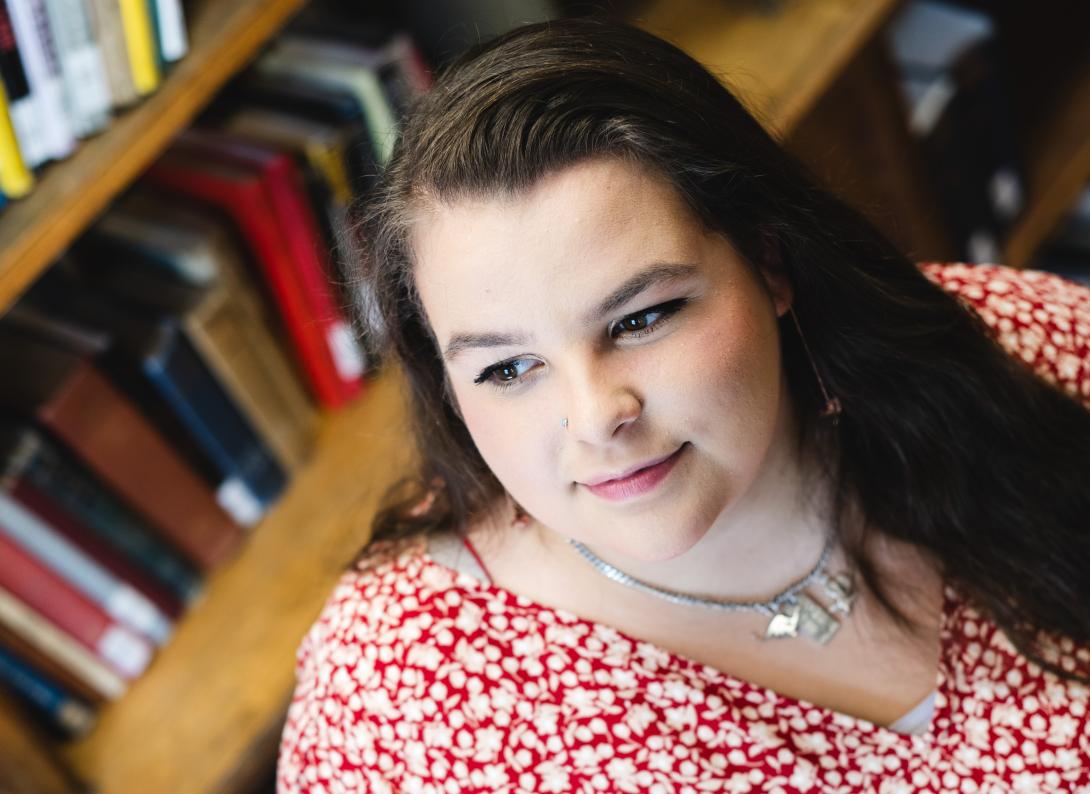
College isn’t just an avenue to acquire marketable skills. It’s an opportunity to pursue a lifelong passion.
Emmy Simpson, a junior, grew up in Summerfield, N.C. She attended Summerfield First Baptist Church. A childhood of going to church and Bible study instilled in her a curiosity about beliefs.
That curiosity drove her to choose a double major, in Religion Studies and Philosophy.
“I grew up in church and my faith is very important to me,” she reflects, “but when studying my faith, I would read passages in the Bible or listen to sermons. I would get very curious about how things were worded or what was said. I would ask questions until I had an answer or until I got more questions.
“I thought if there were these belief systems that people dedicate their whole lives to, that had to be something worth learning about.”
She moved nearly 500 miles north to attend Lehigh, she says, because the department offered “more than a SparkNotes version of the subject”.
That demonstrates abundant passion, but when asked why she’s pursuing Religion Studies as a major, her answer makes one question why anyone wouldn’t.
The subject, she says, “gives you an opportunity to better understand the human condition. It's given me this important understanding of simple things, like respect and kindness and compassion, not despite our differences but because of them.”
While she fully understands pursuing a “practical” major, she chose a different path.
“There's something to be said for studying passion over practicality. I'm passionate about it, so it makes it worth it going to every class, but also learning more about people. It helps you understand baseline ethics we should have towards each other.
“Especially living in such a diverse country, I feel like that's so important for everybody.”
Spotlight Recipient

Emmy Simpson
Religion Studies and Philosophy Double Major
Article By:
There are these larger than life questions that you get out of philosophy that arise from religion.
Simpson has noticed from discussions with other students that the Religion Studies major has a unique feel to it. She credits the faculty and staff.
“They are interested in you as the person, not just you as the student. They're there to see you grow.”
She recalls one interaction with Michael Raposa in his class. Simpson is, unsurprisingly, a GPA-minded sort, and she asked Raposa for advice to achieve a better grade on an assignment. His response was that it was more important for her to learn about the material, and that they would work out the grade later.
“I thought that was really powerful,” she remembers. “He cared more about what I was getting out of it than what my transcript was getting out of it.”
For his part, Raposa shared with Lehigh that Simpson is a rare kind of student…one with a genuine interest in the subject, beyond her desire for a letter grade.
“I always try in a gentle way to challenge my students, encouraging them to examine habits of thought that have become well-entrenched,” he says. “It was delightful to experience Simpson challenging me, pushing back against some of my claims and interpretations…always quite gently but firmly.”
That interaction is, he says, “a dream-like scenario for any professor of the humanities.”
Taking a philosophy course while pursuing her associate’s degree encouraged Simpson to add a philosophy major to her Lehigh journey. It’s not difficult to see the similarities in the two subjects.
“Philosophy and religion do bleed into each other quite a lot. There are these larger than life questions that you get out of philosophy that arise from religion. I became fascinated with the idea that these questions could lead to discovering these fundamental truths about people.”
She believes religion and philosophy naturally focus on the same objective: introducing differing viewpoints.
“In a course that I'm taking, Existentialism, we just finished reading a book by Soren Kierkegaard. The main subject of the book is talking about the existential view of Abraham, when he was willing to sacrifice his son Isaac, like you would read about in Genesis of the Old Testament. It was interesting to see a philosophical side to such a difficult Biblical passage.
“It's really cool to see different perspectives, which is exactly what you get with philosophy, and you get that with religion as well.”
Simpson is accustomed to being questioned why she chose a double major that doesn’t bring to mind an obvious future career path. She frequently hears ‘What do you plan to do with that?’
Her answer is that studying religion and philosophy can help with any vocation.
“My personal dream is to one day be a professor at an academic institution, but I feel like there's a lot of things you could do. If you wanted to study law, there is a need for studying religious law. You could go into therapy positions, if you went to the more medical side of religion and philosophy.
“Religion bleeds into so many different parts of society. You could fit it into a lot of different categories of occupations.”
Even at her young age, Simpson has already seen its benefits.
“Shortly after I received my associate's in Religion Studies, I became a long-term substitute teacher. They somehow trusted this girl right out of community college to watch a bunch of middle school aged kids,” she says with a laugh.
“Having that background in religion, I got to understand the students a lot better. Little cultural things, like why certain students will bring plastic silverware in their backpack, even though they eat at the cafeteria. It's because they're worried that there's non-kosher silverware at the cafeteria. Little things like that you pick up on, you learn more about these students, and it helps you connect with them.
“I feel that's something that is kind of missing, that connection, not just between students and teachers or between kids and adults, but from people in general.
“You can do so much with the knowledge of studying what it means to believe in something.”
